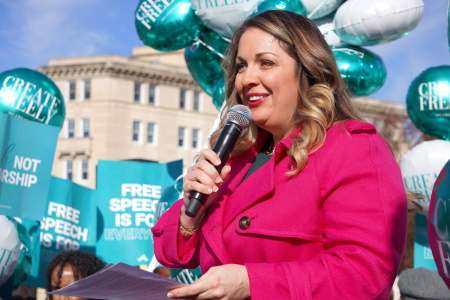Colorado to pay over $1.5 million to settle lawsuit with Christian website designer

Colorado will pay over $1.5 million as part of a settlement with a Christian business owner who won her case at the United States Supreme Court.
Last year, the court ruled that Lorie Smith of 303 Creative could not be forced by a state anti-discrimination law to make websites that go against her sincere religious beliefs.
The Alliance Defending Freedom, a legal nonprofit that helped to represent Smith, announced Tuesday that state officials had agreed to a settlement that included paying over $1.5 million in fees.
ADF CEO and President Kristen Waggoner said in the announcement that the government cannot “force Americans to say things they don’t believe, and Colorado officials have paid and will continue to pay a high price when they violate this foundational freedom.”
“Billions of people around the world believe that marriage is the union of one man and one woman and that men and women are biologically distinct. No government has the right to silence individuals for expressing these ideas or to punish those who decline to express different views,” stated Waggoner.
“Political and cultural winds shift, but the freedom to speak without fear of censorship is a God-given constitutionally guaranteed right, essential for a flourishing society and self-governing people.”
In 2016, Lorie Smith of 303 Creative filed a pre-enforcement challenge to the Colorado Anti-Discrimination Act, which she believed would force her to violate her belief that marriage is a union between one man and one woman.
A three-judge panel of the U.S. Court of Appeals for the 10th Circuit ruled against Smith in July 2021, with the two-judge majority concluding that "Colorado has a compelling interest in protecting both the dignity interests of members of marginalized groups and their material interests in accessing the commercial marketplace.”
“When regulating commercial entities, like Appellants, public accommodations laws help ensure a free and open economy," wrote Circuit Judge Mary Beck Briscoe, a Clinton appointee, in the majority opinion.
"Thus, although the commercial nature of Appellants' business does not diminish their speech interest, it does provide Colorado with a state interest absent when regulating noncommercial activity."
Smith appealed to the Supreme Court, which heard oral arguments in December 2022. The high court ruled 6-3 in her favor in June 2023, with Justice Neil Gorsuch authoring the opinion of the court.
Gorsuch wrote that "no public accommodations law is immune from the demands of the Constitution" and expressed concern over the state's attempt to control Smith's speech.
"Under Colorado’s logic, the government may compel anyone who speaks for pay on a given topic to accept all commissions on that same topic—no matter the underlying message—if the topic somehow implicates a customer’s statutorily protected trait," wrote Gorsuch.
"Equally, the government could force a male website designer married to another man to design websites for an organization that advocates against same-sex marriage ... As our precedents recognize, the First Amendment tolerates none of that."
Gorsuch also wrote that "commitment to speech for only some messages and some persons is no commitment at all" and that "the opportunity to think for ourselves and to express those thoughts freely is among our most cherished liberties and part of what keeps our Republic strong."
Justice Sonia Sotomayor dissented, claiming that the majority "grants a business open to the public a constitutional right to refuse to serve members of a protected class."
"The business argues, and a majority of the Court agrees, that because the business offers services that are customized and expressive, the Free Speech Clause of the First Amendment shields the business from a generally applicable law that prohibits discrimination in the sale of publicly available goods and services. That is wrong. Profoundly wrong," Sotomayor wrote.
"[Colorado's law] targets conduct, not speech, for regulation, and the act of discrimination has never constituted protected expression under the First Amendment. Our Constitution contains no right to refuse service to a disfavored group."






















